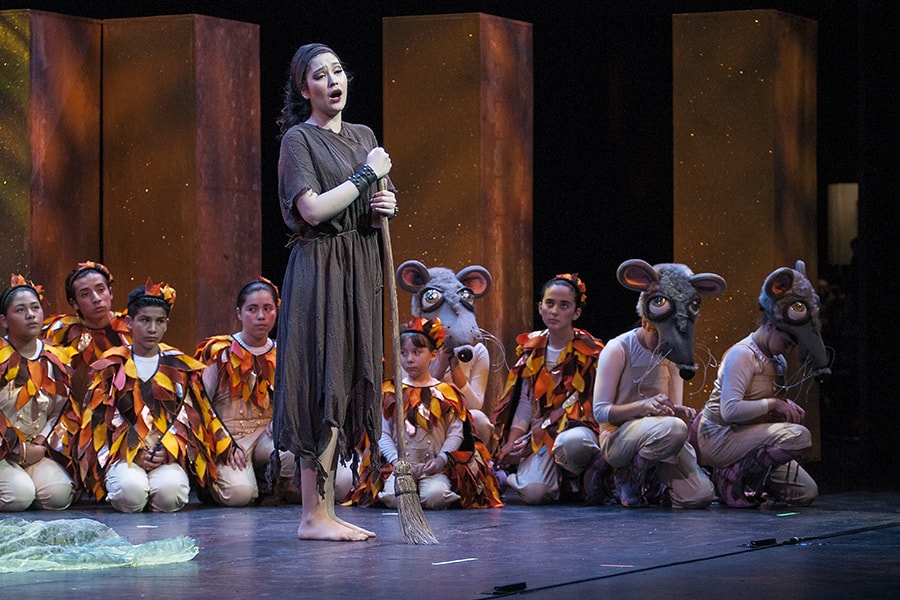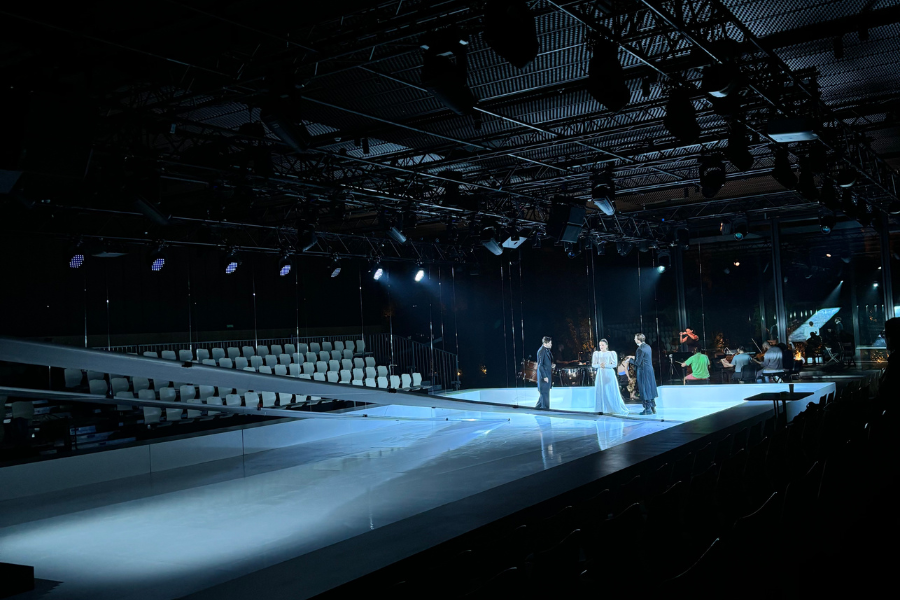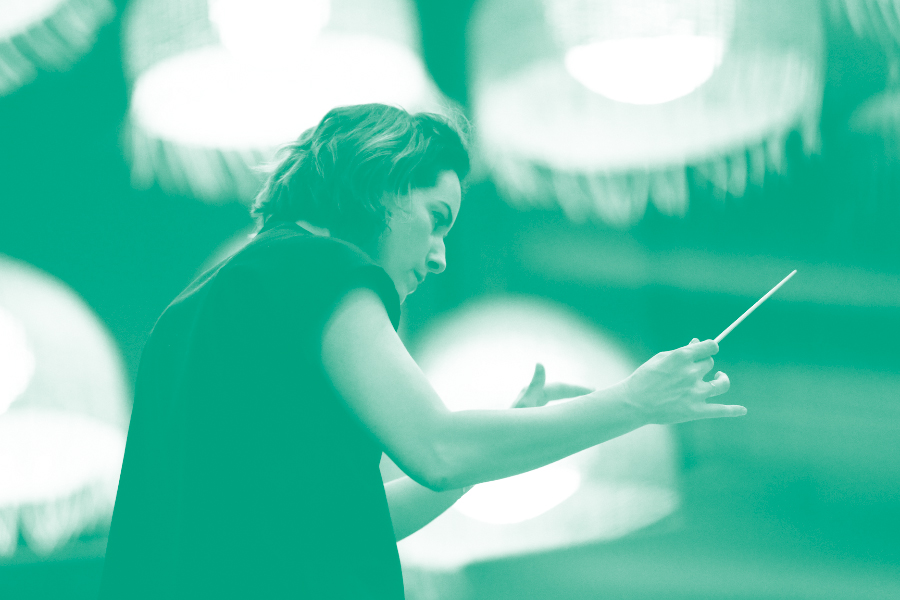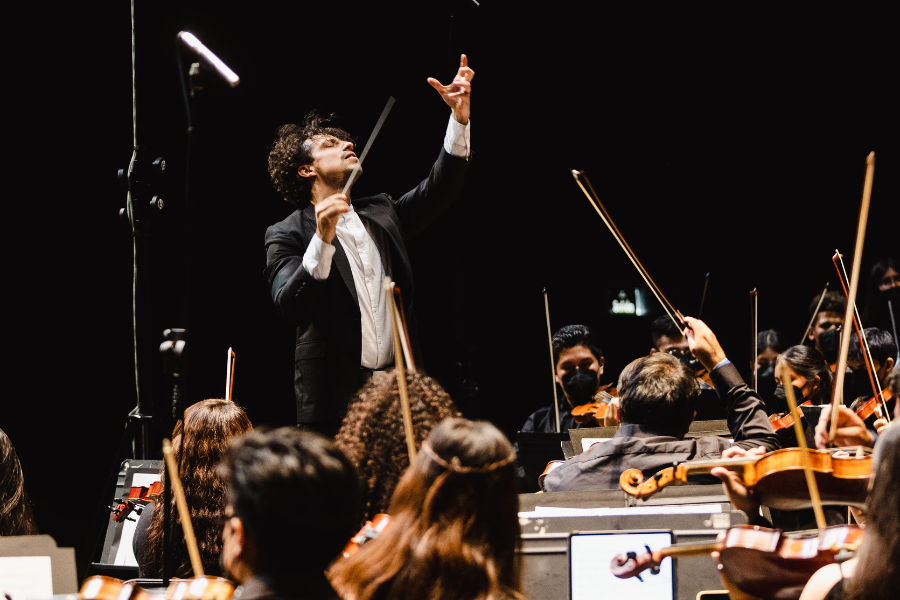Se estrena ópera basada en el clásico de la Cenicienta y la leyenda mapuche La Malen

Con libreto y dirección del actor y director, Felipe Castro la ópera Cenicienta, Magia y leyendas une dos obras de los compositores chilenos Pedro Humberto Allende y René Silva. Será estrenada bajo la dirección musical de Rodolfo Fischer en el Teatro Municipal de Las Condes, junto a la orquesta y tres coros
Este 09 de noviembre en el Teatro Municipal de Las Condes es el estreno de Cenicienta: Magia y Leyendas. La ópera une dos obras de compositores chilenos mediante un relato teatral que enfrenta dos mundos: el de los ojos de una Papai (abuelita en mapudüngun) y su nieta.
El elenco lo conforman 126 niñas, niños y jóvenes que componen la orquesta sinfónica de Panguipulli, Coro Panguipulli, Cantores del Colegio Leonardo Da Vinci, el Coro SIP y un grupo de ballet de jovencitas. Además, serán acompañados por cuatro solistas profesionales.
Todo se ambienta en el Sur de Chile, con un fogón, una señora mayor y una niña llena de colores, generando un encuentro entre vidas distintas, culturas y la realidad social actual. A través del relato de la niña y del cuento musicado de Pedro Humberto Allende Cenicienta (compuesto en 1948 y que será estrenado por primera vez), conoceremos la historia del relato clásico Cenicienta.
En contraste, la abuela contará la historia de “La Malén” o cenicienta mapuche (composición de René Silva basada en el Mito “La niña de la calavera”) que cuenta las aventuras de una niña que es embrujada por encargo de su madrastra, convirtiendo su cara en calavera.
“El proyecto involucra a una orquesta juvenil de más de 10 años”, narra el compositor René Silva, “se fijaron la meta de hacer ópera y tenían la idea de que estuviese basada en una idea local”. “Un día llamé a Elicura Chihuailaf y le pregunté si había alguna leyenda mapuche donde hubiese una madrastra y una princesa, y me contó de la Kalfu Malén, que es la base de nuestra historia. La Malén es hija de un lonko, y su madrastra le hace un hechizo, que transforma su cara en calavera. Ella va a ver a una machi quien le dice que la única forma de anular el embrujo es encontrar los huesos de un guerrero. En su trayecto ayuda a animales en problemas, y estos le indican donde están los huesos”, cuenta Silva.
«Llevo 10 años yendo a Panguipulli conociendo el programa Vive la Música y el lanzamiento de este trabajo me produce una satisfacción enorme. Siento que hay una unión de voluntades gigantescas que conforman un círculo virtuoso y único. Estamos frente a un trabajo inédito, de gran excelencia, y que encima está hecho, nada más y nada menos, por niñas y niños», nos cuenta Felipe Castro, director general de la obra. E insiste: «estoy feliz porque hay un gran equipo humano. Es muy emocionante ver a niñas y niños tan comprometidos. Nunca había visto antes abordar una temática local, donde se hable de volcanes, bosques, magia, con tanto cariño y profesionalismo. Creo que tendremos un espectáculo brillante».
Cuéntanos un poco más sobre esta producción, ¿Cómo nace y se desarrolla el proceso creativo y de composición?
René Silva: Creo firmemente en cómo las energías se alinean cuando tienen que hacerlo y también en cómo las personas se encuentran cuando deben. Todo fue una sucesión de coincidencias y buenas energías que se fueron dando desde que recibí el llamado de Rodolfo Fischer invitandome a participar de este proyecto. Felipe decide asumir la elaboración del libreto, así que con Rodolfo lo asesoramos desde el punto de vista musical y dramático que requiere una ópera. Felipe escribió pensando en recitativos, arias, corales y duetos. Él escribió el texto imaginando la música de inmediato y eso se notó. El texto era hermoso y muy musical lo cual facilitó enormemente que pudiera terminar de componer la obra en el plazo estipulado de 3 meses. Pero más allá de los plazos, el mismo texto iba llamando a la música. Pude traspasar fácilmente esas líneas en sonidos, las palabras sugerían melodías y las escenas escritas se prestaban para poner sonoridades de bosques y naturaleza. Yo estaba encantado.
Fue un periodo de muchas horas de trabajo, muchas amanecidas escribiendo. Rodolfo fue mi copista, así que yo escribía y le iba enviando los manuscritos. El digitalizaba y me enviaba el material para revisión; y mientras tanto, yo seguía escribiendo otras escenas. Fue un proceso muy vertiginoso, pero todo el tiempo lo hice con gran cariño y una enorme alegría. Sabía que esta obra dejaría una huella imborrable en los niños que participan de ella y en sus familias. De todas maneras nunca dimensioné hasta llegar a Panguipulli a los ensayos finales, como esto se conviritó en un verdadero proyecto comunitario. Eso fue hermoso, ver a tanta gente trabajando en torno a tu música. Imaginate!
Es reconocido tu trabajo con jóvenes, Cuál es el valor que le asignas a la formación y desarrollo de nuevas audiencias por medio de este tipo de producciones en las cuales los artistas son pares de la audiencia que asiste?
René Silva: Sobre el valor de este tipo de producciones pienso en la educación musical actual: ¿Qué sacamos con mostrar la música en las escuelas de manera teórica? Tenemos que llevar a los niños a conciertos, que puedan ver y escuchar de cerca una orquesta, una puesta en escena. Que puedan sentir la energía y la magia de un espectáculo de este tipo. Imagínate si además los hacemos parte de un proyecto colectivo!! Creo que eso a largo plazo se vuelve mucho más trascendental ya que se convierte en un aprendizaje significativo adquirido por medio de la práctica. Eso con los años, no lo olvidarán jamás. Entonces, ahí están las nuevas audiencias.
¿Con qué nos encontraremos en escena? ¿será un visión más actual de la leyenda mapuche o nos llevarás a los bosques ancestrales del sur de Chile?
Felipe Castro: Nos encontraremos con un misterio. Todo el sur es misterioso y en particular los bosques de la región de los ríos… Esos bosques estuvieron mucho antes que nuestros pueblos originarios y por lo mismo hablan por sí mismos. rené silva tuvo la valentía de hacer cantar una machi desde el sonido de los ríos… hizo cantar a malen desde lo profundo del mar… eso es lo que verán en escena. Magia pura. Misterio.
¿De dónde nace la idea de contrastar el clásico de la infancia “La Cenicienta” con la leyenda mapuche “Malen”? ¿Cómo se desarrolló la creación del libreto?
Felipe Castro:Nosotros teníamos la Cenicienta de Peña Hen y la Cenicienta de P.H. Allende. La familia de Peña Hen no nos dejó hacer su Cenicienta y como las vueltas de la vida son misteriosas alguien enloqueció ( yo creo que fue el Maestro Fischer) y propuso hacer una ópera. Lo pueden creer… de una negación nace una ópera!!! El punto es que como esto se gestó para Panguipulli buscamos algo que tuviera que ver con Panguipulli. De ahí por pura casualidad (y la complicidad de René Silva) llegó la niña de la calavera y sucede que tiene muchas coincidencias con la Cenicienta… pero lo que no es, repito: lo que no es… es ser una Cenicienta mapuche. Nunca fue la idea. La Malen desde su inicio voló con alas propias, el guión fluye siempre desde el sonido del volcán y no cualquier volcán, es ese volcán; nunca fue cualquier lago, era el lago Panguipulli.
Desde el guión siguen de largo los pajaritos y ratoncitos, pero la que gobierna es la Loica. Siguen de largo las madrastras pero la que gobierna la maldad es la Kalku. Los que quieran aproximarse al lado oscuro… averiguen de la kalku.. y les recomiendo no encontrarse con ella.
Háblanos sobre el contraste de la dirección teatral con la dirección de ópera? ¿ Y cómo un actor se involucra con el mundo lírico?
Felipe Castro: Para mi la epifanía solo se encuentra cuando se juntan las artes. La ópera es ese lugar. No hay contrastes en la dirección.
Yo siempre confío en las actrices, en este caso cantantes-actrices, ellas tienen herramientas para saber llevar una escena desde la actuación y desde el canto. Además ellas se ganaron el derecho para estar ahí, ellas audicionaron y nosotros, por cierto, tuvimos la suerte de quedarnos con las mejores, son increíbles. Las cuatro construyen enormes personajes.
Yo antes de nacer ya participaba de la pasión de San Mateo de Bach, mi madre (Mary Ann Fones) cantaba la pasión de San Mateo conmigo de 4 meses de gestación. Esa si es la mejor de las condenas.
Yo siento y vivo la música desde la sangre, y a veces, cuando todos las estrellas se alinean, también la siento en el alma. En la Malen se produjo ese milagro.
Cuéntanos sobre la experiencia de trabajar con este joven compositor, fue un trabajo en conjunto?
Rodolfo Fischer: Éste ha sido uno de los proyectos más extraordinarios en los que me ha tocado participar. Desde la primera conversación con Pamela Calsow, quien se entusiasmó con la Cenicienta de Peña Hen, hasta la transmutación en Malen de René, todos los procesos han tenido la dinámica dignos del realismo mágico.
La negativa de los Peña se transformó en energía creativa, que gracias a la armonía entre los articuladores del espectáculo, logró entusiasmar no solo a los niños, sino a toda una comunidad en torno al arte. Finalmente, creo que el maestro Peña Hen sería el más feliz de todos, puesto que el objetivo final de formar a través de la música se logró con creces.
La particularidad de haber seleccionado a René se debió a dos factores fundamentales. El tenía una amplia experiencia como director de orquestas juveniles, lo cual nos aseguraba un conocimiento real de las posibilidades técnicas y limitaciones de los niños. Y, por otro lado, su cercanía con el tema étnico a través de numerosas creaciones previas a Malén. Lo que no sabíamos es que tenía un potencial enorme como compositor de ópera!
Una nueva producción siempre implica un desafío, ¿Cómo crees que se puede fomentar en Chile el desarrollo de nueva creación?
Rodolfo Fischer: A través de liderazgos como el de Pamela Calsow, por ejemplo. Muchos gestores culturales se obsesionan con la idea de crear espectáculos con formatos archi probados, con tal de tener una sala llena. Cuantas veces más vamos a programar anualmente Traviata, Carmen y Flauta Mágica? Creo que esta veta de creación tiene un enorme potencial para atraer a muchas personas a la ópera, a través de las orquestas juveniles y con misión formativa. Y dicho sea de paso, le estamos dando trabajo a jóvenes cantantes, compositores y artistas visuales que buscan nuevas alternativas para desarrollarse. Los profesionales tenemos que hacernos cargo de abrirnos a proyectos alternativos como el de Panguipulli, puesto que somos relativamente pocos los que hemos tenido el privilegio de montar óperas en grandes escenarios. Es nuestro deber compartir lo que hemos aprendido con las generaciones futuras.
Cenicienta, Magia y Leyendas es posible gracias a la Corporación de Adelanto Amigos de Panguipulli, la Corporación Municipal de Panguipulli y cinco de sus establecimientos educacionales, la Red de Colegios SIP, el Teatro Municipal de Las Condes y la Junta Nacional de Auxilio Escolar y Becas (JUNAEB).
DONDE Y CUANDO
Teatro Municipal de Las Condes.
Funciones
- 9 de noviembre 20:00 horas
- 10 de noviembre 20:00 horas
- 11 de noviembre 18 horas
DURACIÓN: 75 minutos sin intermedio
CALIFICACIÓN: Familiar





